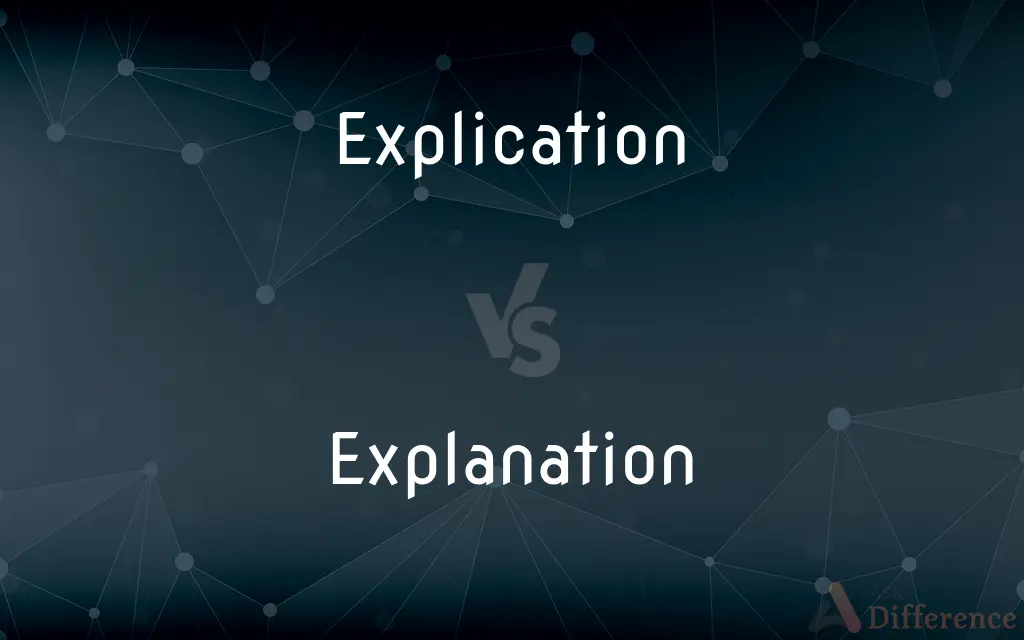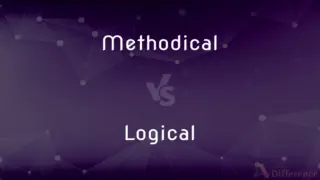Explication vs. Explanation — What's the Difference?
By Fiza Rafique & Urooj Arif — Updated on March 7, 2024
Explication delves deeply into text or concept analysis, focusing on meaning and nuances, while explanation clarifies by making something understandable or clear.

Difference Between Explication and Explanation
Table of Contents
ADVERTISEMENT
Key Differences
Explication is a detailed analysis, often used in literature, to unfold the meaning of texts or concepts, focusing on nuances and complexities. It involves a close reading of the material, considering every aspect to reveal deeper insights. On the other hand, an explanation is a general process of making something clear or understandable, applicable across various contexts including science, history, and everyday occurrences. It aims to clarify by providing reasons, causes, or how something works.
While explication is primarily textual and analytical, aiming to uncover layers of meaning in a specific context, explanation is broader, addressing a wider audience and often seeking to answer "why" or "how" questions. Explications are more common in academic or critical studies, whereas explanations are found in educational, professional, and daily life settings.
Explications require a deep engagement with the text, often dissecting language, structure, and symbolism to interpret meaning. They are meticulous, requiring time and scholarly insight. Explanations, however, can be concise, aiming for immediate clarity and understanding, often simplifying complex concepts.
The outcome of an explication is a thorough understanding of a text's or concept's intricate details and hidden layers. It enriches the reader's or listener's comprehension and appreciation. Conversely, the goal of an explanation is to demystify, ensuring the audience grasps the basic concept, process, or reason behind something.
Both explication and explanation are crucial for knowledge dissemination and understanding. While explications deepen insight and foster analytical thinking, explanations ensure concepts are accessible to a broader audience, facilitating learning and comprehension across various subjects.
ADVERTISEMENT
Comparison Chart
Purpose
Unfold meaning in detail, focusing on nuances
Make something clear or understandable
Context
Often textual analysis in literature or philosophy
Broad, including science, history, everyday situations
Audience
Academic or those seeking deep understanding
General, wider audience
Approach
Detailed analysis, considering all aspects
Often simplifies, aiming for clarity
Outcome
Deep insight into text or concept
Basic understanding of a concept or process
Compare with Definitions
Explication
Often used in literary and philosophical contexts.
The explication of the philosophical text illuminated its complex arguments.
Explanation
A statement that makes something clear.
The teacher's explanation helped the student understand complex math problems.
Explication
Focuses on linguistic and structural elements.
Her explication dissected the novel's symbolism, enhancing our appreciation.
Explanation
Applicable across various contexts.
Her explanation of the process made the technology accessible to non-experts.
Explication
Aims to uncover hidden layers and nuances.
Through explication, obscure references in the text became clear and meaningful.
Explanation
Ensures concepts are accessible to a broader audience.
The guide's explanation of the historical event made it interesting for all visitors.
Explication
A detailed analysis of a text to reveal its meaning.
The professor's explication of the poem offered new insights into its themes.
Explanation
Often seeks to answer "why" or "how".
The documentary provided an explanation for the phenomenon, making it understandable.
Explication
Enhances comprehension and appreciation.
His explication of the historical document deepened our understanding of its significance.
Explanation
Clarifies by providing reasons or causes.
The scientist's explanation of the experiment outlined its purpose and outcomes.
Explication
Explication (German: Explikation) is the process of drawing out the meaning of something which is not clearly defined, so as to make explicit what is currently left implicit. The term explication is used in both analytic philosophy and literary criticism.
Explanation
An explanation is a set of statements usually constructed to describe a set of facts which clarifies the causes, context, and consequences of those facts. This description may establish rules or laws, and may clarify the existing rules or laws in relation to any objects, or phenomena examined.Explanation, in philosophy, is a set of statements that makes intelligible the existence or occurrence of an object, event, or state of affairs.
Explication
To make clear the meaning of; explain.
Explanation
The act or process of explaining
Launched into a detailed explanation.
Explication
The act of opening or unfolding.
Explanation
Something that explains
That was supposedly the explanation for their misdeeds.
Explication
The act of explaining; an explanation.
Explanation
A mutual clarification of misunderstandings; a reconciliation.
Explication
The sense given by an expositor.
Explanation
The act or process of explaining.
The explanation was long and drawn-out.
Explication
The act of opening, unfolding, or explaining; explanation; exposition; interpretation.
The explication of our Savior's parables.
Explanation
Something that explains, makes understandable.
An explanation for the UFO sightings was easily found.
Explication
The sense given by an expositor.
Explanation
A resolution of disputed points pursuant to discussion; a mutual clarification of disputed points; reconciliation.
Explication
The act of making clear or removing obscurity from the meaning of a word or symbol or expression etc.
Explanation
The act of explaining, expounding, or interpreting; the act of clearing from obscurity and making intelligible; as, the explanation of a passage in Scripture, or of a contract or treaty.
Explication
A detailed explanation of the meaning of something
Explanation
That which explains or makes clear; as, a satisfactory explanation.
Explanation
The meaning attributed to anything by one who explains it; definition; interpretation; sense.
Different explanations [of the Trinity].
Explanation
A mutual exposition of terms, meaning, or motives, with a view to adjust a misunderstanding, and reconcile differences; reconciliation; agreement; as, to come to an explanation.
Explanation
A statement that makes something comprehensible by describing the relevant structure or operation or circumstances etc.;
The explanation was very simple
I expected a brief account
Explanation
Thought that makes something comprehensible
Explanation
The act of explaining; making something plain or intelligible;
I heard his explanation of the accident
Common Curiosities
What is explication?
Explication is a detailed analysis aimed at revealing the deeper meaning and nuances of a text or concept.
Why is explication important in literature?
Explication is important in literature because it uncovers hidden layers, enhances comprehension, and fosters appreciation of texts.
How does explanation differ from explication?
Explanation aims to make something clear or understandable, often addressing a broader audience, while explication involves a deep, detailed analysis focusing on nuances.
Is one method superior to the other?
Neither method is superior; each serves different purposes and audiences in the dissemination of knowledge.
In what context is explication commonly used?
Explication is commonly used in literary and philosophical contexts to analyze texts deeply.
What skills are necessary for effective explication?
Effective explication requires analytical thinking, attention to detail, and a deep understanding of language and structure.
Are explanations relevant in professional settings?
Yes, explanations are crucial in professional settings to clarify processes, decisions, and concepts.
Can explanation be considered a form of simplification?
Yes, explanations often simplify complex concepts to make them understandable to a broader audience.
Is an explanation always simple?
While explanations aim to be clear, they can vary in complexity depending on the topic and audience's prior knowledge.
How do explications and explanations contribute to learning?
Explications deepen understanding and analytical thinking, while explanations facilitate comprehension across various subjects.
Can an explication also include explanations?
Yes, an explication can include explanations as part of its detailed analysis to clarify certain elements.
How can one improve their explanation skills?
Improving explanation skills involves understanding the audience, simplifying complex ideas, and practicing clear communication.
How can teachers balance explication and explanation in education?
Teachers can balance these by using explication for deeper analysis and explanation for general comprehension, depending on the subject and student needs.
Does explication apply to non-textual materials?
While primarily used for texts, explication can apply to any material or concept that requires deep analysis.
How does one approach creating an explication?
Creating an explication involves close reading, considering all textual aspects, and engaging deeply with the content.
Share Your Discovery

Previous Comparison
Methodical vs. Logical
Next Comparison
Spot vs. SeeAuthor Spotlight
Written by
Fiza RafiqueFiza Rafique is a skilled content writer at AskDifference.com, where she meticulously refines and enhances written pieces. Drawing from her vast editorial expertise, Fiza ensures clarity, accuracy, and precision in every article. Passionate about language, she continually seeks to elevate the quality of content for readers worldwide.
Co-written by
Urooj ArifUrooj is a skilled content writer at Ask Difference, known for her exceptional ability to simplify complex topics into engaging and informative content. With a passion for research and a flair for clear, concise writing, she consistently delivers articles that resonate with our diverse audience.
















































